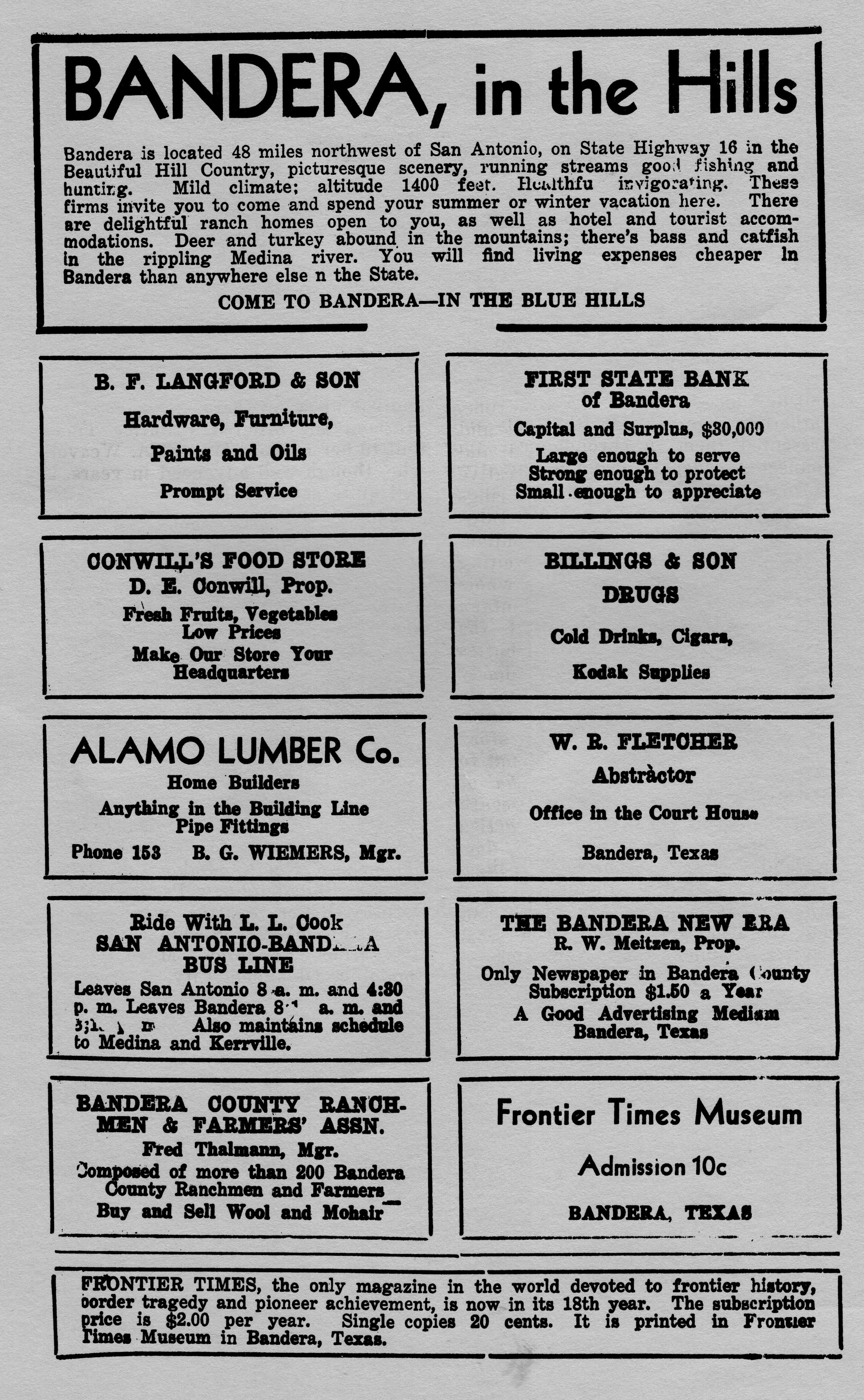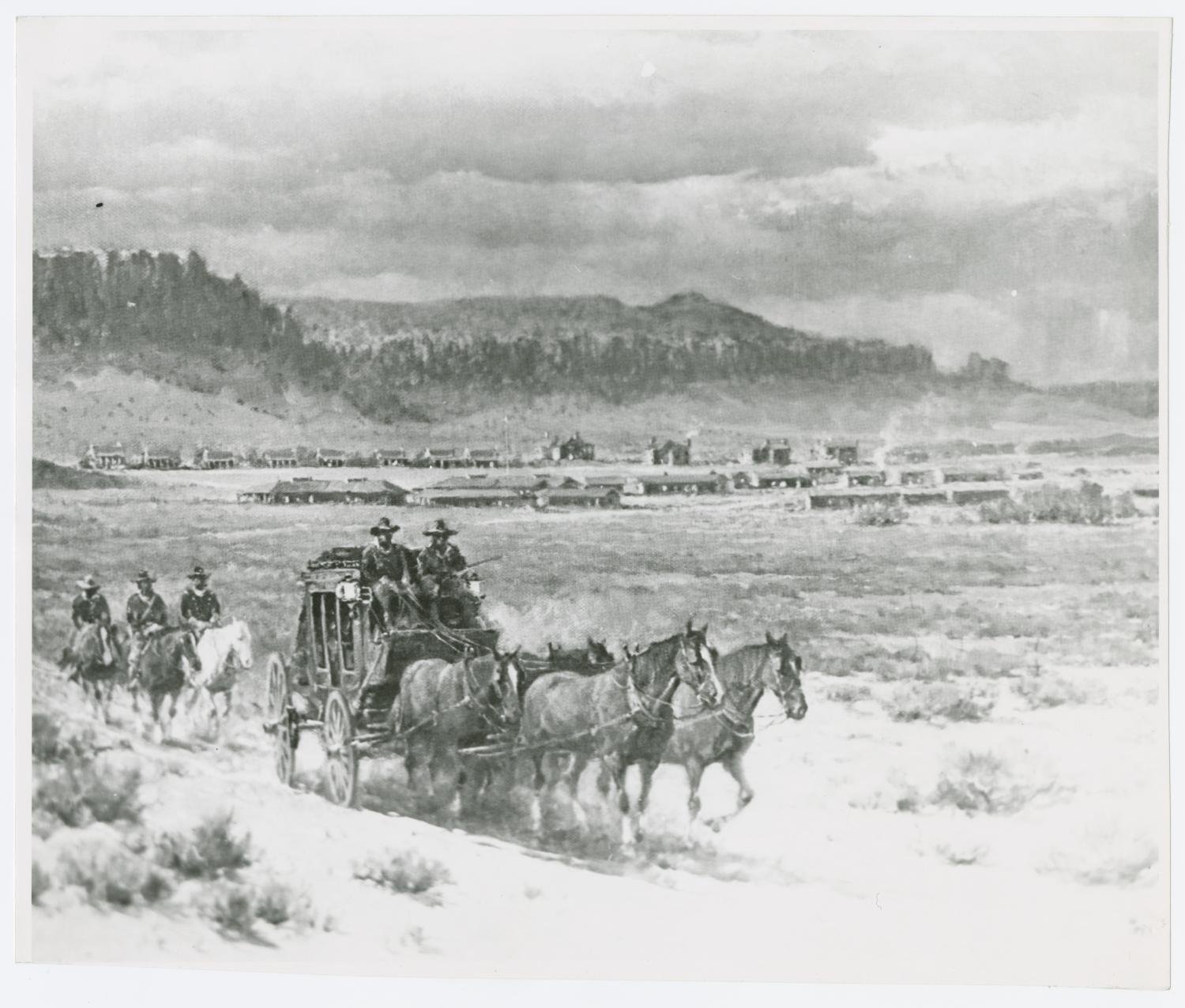January 2023 Newsletter
Hunter’s Corner
Frontier Times Magazine
Volume 19-No. 4
January, 1942
Frontier Tales
Frontier Tales
Rebecca Huffstutler Norton
How long does it take you to drive to San Antonio? If the endless construction on I-H 10 does not delay your trip, it’s possible to make it to San Antonio in less than a half-hour. Next time you’re stalled in traffic, don’t complain, just remember what the earlier residents of the Hill Country had to endure while they traveled throughout the area. Prior to 1914, the only roads in the Hill Country were rough trails that may or may not have been covered in gravel. Rains would transform the roads into muddy rivers leaving deep holes to maneuver around. Summer droughts would cause dirt devils to blow dust in eyes and up noses.
Often roads would traverse across fenced pastures, causing the traveler to stop and open a gate while making sure no livestock escaped. The roads would follow the easiest path, running along river bottoms while avoiding steep hills and mountains. The only directional signage would be stones with painted arrows or perhaps the distance to the next town – a welcomed sign for travelers hoping they were still on the right path.
Settlers living on the upper part of the Medina River usually hauled their wagonloads of wool, mohair and produce to market on a road which led downriver to Bandera, up to Camp Verde through Bandera Pass, and onto Center Point and the San Antonio and Aransas Pass Railroad that ran through Center Point. If they dared to take the shortest route over the Medina Hill, they faced stone ledges and drop offs. In 1914, the editor of the Kerrville Mountain Sun wrote the road could only be traversed by wagons with the lightest loads.
Stagecoach service between Bandera and San Antonio was available by way of Boerne. Travelers would embark from San Antonio to Boerne where they would catch a different coach to travel onto Bandera. The stagecoach went the way of what is now Highway 46, coming to a stagecoach stop whose buildings still sit today at the intersection of Highway 46 and Highway 16. Here horses were switched for fresh horses and passengers had a chance to freshen up and get a bite to eat before the last of their journey into Bandera. The stagecoach was also used to deliver the mail, replacing the riders who brought mail back and forth between Boerne and Bandera by horseback.
The stagecoach service operated until 1913, when it was replaced with motor driven Jitney Ford buses. In Bandera, Isaac Langford built the popular Langford House hotel where passengers would gather to be picked up by the Cox Bus Line for the four-hour trip to San Antonio. The trip would take longer if the roads were muddy. If the bus got stuck in the mud, the passengers would have to wait for a mule team to come and rescue them by pulling the bus through the bad spots.
As you travel be safe and enjoy the comfort of your automobile and the beauty of paved roads.
2023 Events
Book Signing & Lecture - Jan 14th
Jamboree
January 22nd
Museum Supporters
Thank you to our supporters
January 2023
Members Renew
Lee Parsons
Mary Schenk
Eddie & Carol Rowe
Bob & Barbara Berlin
Chuck Lutke
Donations
Santa Claus
Mary Schenk
Helen Peterson
Capital Campaign Donations
Jake & Kari Short
Harry & Dianna Harris
Donations in Memory of
Robert & Christine Smallwood in memory of Jane Graham
Volunteers
Holly Boyle
Elizabeth Griffith
Toni Kunz
Logan Miles
Jennifer Nimmrichter
Eddie Rowe
John Schuetze
Roger Wolfe
Lanie Wood-Intern
Volunteers-Jamboree Musicians
Lew Pewterbaugh
Paul Hilliard
David Le Steourgeon
Lee Harmon
Lee Haile
Homer Whisenant
Lee & Buster Carr
Bob DeGeorge
Dennis Owen
Become a member today!
Mail your check to Frontier Times Museum
P.O.Box 1918 Bandera, TX 78003
Individual: $25
Family & Friends: $50
Sustaining: $100
Business: $100
Patron: $250
Hunter's Museum Circle: $500








